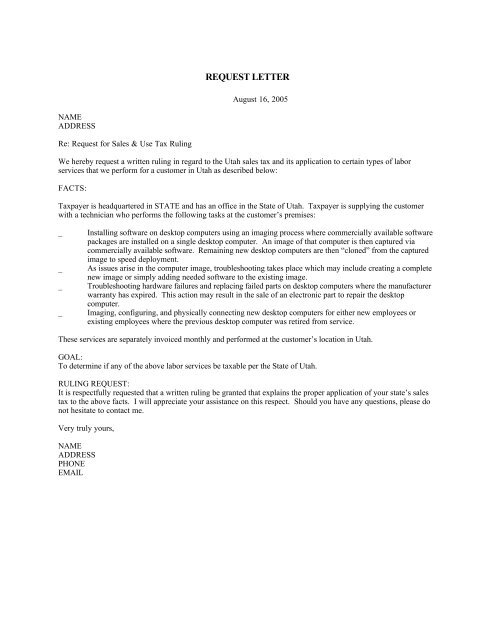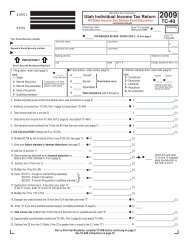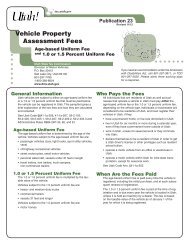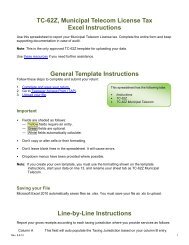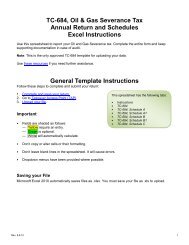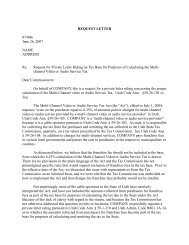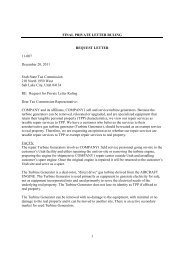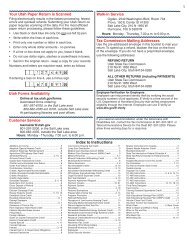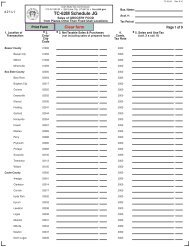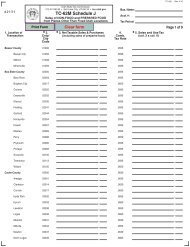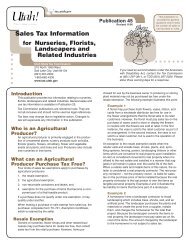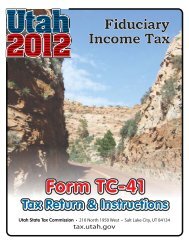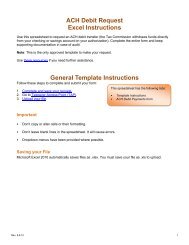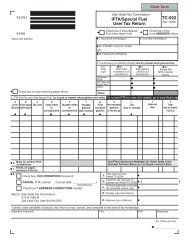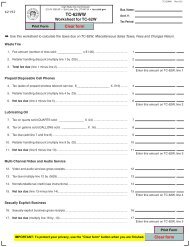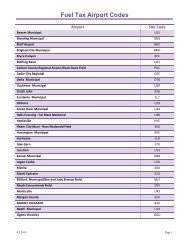Tax Commission Private Letter Ruling - Utah State Tax Commission
Tax Commission Private Letter Ruling - Utah State Tax Commission
Tax Commission Private Letter Ruling - Utah State Tax Commission
You also want an ePaper? Increase the reach of your titles
YUMPU automatically turns print PDFs into web optimized ePapers that Google loves.
NAME<br />
ADDRESS<br />
Re: Request for Sales & Use <strong>Tax</strong> <strong>Ruling</strong><br />
REQUEST LETTER<br />
August 16, 2005<br />
We hereby request a written ruling in regard to the <strong>Utah</strong> sales tax and its application to certain types of labor<br />
services that we perform for a customer in <strong>Utah</strong> as described below:<br />
FACTS:<br />
<strong>Tax</strong>payer is headquartered in STATE and has an office in the <strong>State</strong> of <strong>Utah</strong>. <strong>Tax</strong>payer is supplying the customer<br />
with a technician who performs the following tasks at the customer’s premises:<br />
_ Installing software on desktop computers using an imaging process where commercially available software<br />
packages are installed on a single desktop computer. An image of that computer is then captured via<br />
commercially available software. Remaining new desktop computers are then “cloned” from the captured<br />
image to speed deployment.<br />
_ As issues arise in the computer image, troubleshooting takes place which may include creating a complete<br />
new image or simply adding needed software to the existing image.<br />
_ Troubleshooting hardware failures and replacing failed parts on desktop computers where the manufacturer<br />
warranty has expired. This action may result in the sale of an electronic part to repair the desktop<br />
computer.<br />
_ Imaging, configuring, and physically connecting new desktop computers for either new employees or<br />
existing employees where the previous desktop computer was retired from service.<br />
These services are separately invoiced monthly and performed at the customer’s location in <strong>Utah</strong>.<br />
GOAL:<br />
To determine if any of the above labor services be taxable per the <strong>State</strong> of <strong>Utah</strong>.<br />
RULING REQUEST:<br />
It is respectfully requested that a written ruling be granted that explains the proper application of your state’s sales<br />
tax to the above facts. I will appreciate your assistance on this respect. Should you have any questions, please do<br />
not hesitate to contact me.<br />
Very truly yours,<br />
NAME<br />
ADDRESS<br />
PHONE<br />
NAME<br />
ADDRESS<br />
RESPONSE LETTER<br />
March 14, 2007<br />
RE: <strong>Private</strong> <strong>Letter</strong> <strong>Ruling</strong> Request – Issues relating to computer software<br />
Dear NAME,<br />
You have requested an advisory opinion regarding possible <strong>Utah</strong> sales and use tax liability<br />
of a STATE company doing business in <strong>Utah</strong>. To assist in answering your specific questions, I<br />
will first provide an overview of <strong>Utah</strong>’s laws and policies concerning computer software for<br />
purposes of sales and use tax.<br />
<strong>Utah</strong> law generally provides for sales or use tax on the sale and repair of tangible personal<br />
property. <strong>Utah</strong> Code Ann. Section 59-12-103(1)(a) provides for a tax on “retail sales of tangible<br />
personal property made within the state.” <strong>Utah</strong> Code Ann Section 59-12-103(1)(g) applies the<br />
same tax to “amounts paid or charged for services for repairs or renovations of . . . tangible<br />
personal property” along with the “parts used in the repairs.” The tax on repairs or renovations<br />
applies “whether or not any parts are actually used in the repairs or renovations of the tangible<br />
personal property.” <strong>Utah</strong> Code § 59-12-103(1)(g)(ii). Installing items of tangible personal<br />
property are considered repairs unless the installation is to real property. <strong>Utah</strong> Code Ann.<br />
Section 59-12-102(73) describes the act of installation as “attaching tangible personal property to<br />
other tangible personal property” and defines this installation as a part of “repairs or renovations<br />
of tangible personal property.”<br />
Both computers and prewritten computer software are tangible personal property under<br />
<strong>Utah</strong> law. Computers are covered under <strong>Utah</strong> Code Ann. Section 59-12-102(93)(a). This statute<br />
defines as personal property items that may be seen, weighed, measured, felt, touched, or are in<br />
any manner perceptible to the senses. Meeting any one of these conditions will bring the item<br />
into the definition of personal property. Prewritten software is defined by <strong>Utah</strong> Code Ann.<br />
Section 59-12-102(65) as “computer software that is not designed and developed . . . to the<br />
specifications of a specific purchaser.” (Emphasis added). <strong>Utah</strong> Code Ann. Section 59-12-
102(93)(b) includes prewritten computer software in the definition of tangible personal property.<br />
Custom software qualifies for different treatment than prewritten software. The<br />
definition of “prewritten software” excludes software that is “designed and developed . . . by the<br />
author or other creator of the computer software . . . to the specifications of a specific<br />
purchaser.” <strong>Utah</strong> Code Ann. § 59-12-102(65). There is no sales tax on custom software.<br />
A business with an office, service enterprise, or similar place of business in <strong>Utah</strong> is<br />
required to collect sales tax on taxable sales of goods and services in the state. <strong>Utah</strong> Code Ann. §<br />
59-12-107. The business must also create and keep records that separately state the amounts of<br />
taxable and non-taxable sales. <strong>Utah</strong> Code Ann. § 59-12-111; <strong>Utah</strong> Administrative Rule R865-<br />
19S-22.<br />
<strong>Tax</strong>able Transactions<br />
Applying these statutes and rules to your situation, most of your computer work will be<br />
taxable. Selling prewritten software or hardware is taxable as a sale of tangible personal property<br />
under <strong>Utah</strong> Code Ann. Section 59-12-103(1)(a). Troubleshooting and fixing prewritten software,<br />
or a software problem, would be taxable under <strong>Utah</strong> Code Ann. Section 59-12-103(1)(g) as a<br />
“repair or renovation” to “tangible personal property.” Under <strong>Utah</strong> Code Ann. Section 59-12-<br />
103(1)(g)(ii), changing software settings or making similar adjustments would be taxable as a<br />
repair because it is not necessary to replace parts to come within the definition of a repair.<br />
Installing prewritten software would be taxable as attaching one item of tangible personal<br />
property (software) to another item of tangible personal property (a computer). See <strong>Utah</strong> Code<br />
Ann. § 59-12-102(73). This is true whether you are installing the software one program at a time<br />
or whether you use an imaging process to speed the installation.<br />
Nontaxable Transactions<br />
Under the same statutes and rules, some of your work will not be subject to sales or use<br />
tax. Diagnosing a problem that does not lead to change in software or hardware is not a “repair or<br />
renovation” under <strong>Utah</strong> Code Ann. Section 59-12-102(73). Therefore, a diagnostic service is not<br />
taxable. See <strong>Utah</strong> Code Ann. § 59-12-103(1)(g). From your description of the services you<br />
provided, you may have at least two types of consultation that results in no repair. First, you<br />
described instances in which the computer problem turns out to be operator error. In these<br />
instances, you indicated that you instruct the user rather than making any changes to the<br />
computer or its software. Second, your work may uncover problems with software or hardware<br />
that, for various reasons, the client may not wish to have you remedy. These services are<br />
likewise consultation only and are not subject to tax.
Conclusion<br />
For non-taxable work you complete, your invoices will need to separately state the<br />
taxable and non-taxable items. In addition to the statutory requirements to do so, see <strong>Utah</strong> Code<br />
Ann. § 59-12-111; see also <strong>Utah</strong> Administrative Rule R865-19S-22, there is a practical reason. If<br />
an auditor reviewing your tax documents has no way to separate taxable and non-taxable items,<br />
there will be no way for you to support your reasons for not collecting sales tax on some of the<br />
services that you provided to your clients. You indicated that you currently bill repairs and<br />
consultation under the same billing code but could separate these two categories. Given that<br />
repairs, as described in <strong>Utah</strong> statute and this opinion, are taxable and consultation that does not<br />
result in a repair is not taxable, you should consider separately stating or invoicing these services.<br />
This may depend on whether you do enough consultation work to make this worthwhile.<br />
Finally, you indicated that you do not write custom software or write code or otherwise<br />
modify prewritten software. If this should change, you should review the tax policies for<br />
services related to custom software. Writing custom software and many related activities are not<br />
subject to <strong>Utah</strong> sales and use tax. See <strong>Utah</strong> Code Ann. § 59-12-102(65); see also <strong>Utah</strong> Code<br />
Ann. § 59-12-103. You may also request another <strong>Private</strong> <strong>Letter</strong> <strong>Ruling</strong> from the <strong>Tax</strong><br />
<strong>Commission</strong>.<br />
The <strong>Tax</strong> <strong>Commission</strong> provides this opinion on the basis of the information you<br />
presented. This ruling only applies to the specific fact situation, and for the individuals,<br />
addressed in this letter. If you wish to address these or other <strong>Utah</strong> tax concerns further, please<br />
do not hesitate to contact us.<br />
For the <strong>Commission</strong>,<br />
Marc B. Johnson<br />
<strong>Commission</strong>er<br />
MBJ/CDJ/05-018


